I recently passed the Microsoft certification exam for 70-341. To celebrate this achievement, I would like to tell you that I used GreatExam Microsoft 70-341 braindumps.
QUESTION 211
You have an Exchange Server 2013 organization named contoso.com that contains 10 servers. Your company purchases a company named Fabrikam, Inc. Fabrikam has an Exchange Server organization named fabrikam.com. All of the email messages sent between the organizations is routed over the Internet.
You need to ensure that the email messages sent from contoso.com to fabrikam.com are encrypted.
What is best way to achieve the goal? More than one answer choice may achieve the goal. Select the BEST answer.
A. Create a Send connector of type Partner.
B. Instruct all of the users in contoso.com to use SMIME.
C. Modify the Authentication settings for the Send connectors in contoso.com.
D. Create a federation trust between the organizations.
Answer: A
Explanation:
Create a Send connector to send email to a partner, with Transport Layer Security (TLS) applied If you want to ensure secure, encrypted communication with a partner, you can create a Send connector that is configured to enforce Transport Layer Security (TLS) for messages sent to a partner domain. TLS provides secure communication over the Internet.
See step 2 below.
1. In the EAC, navigate to Mail flow > Send connectors, and then click Add .
2. In the New send connector wizard, specify a name for the send connector and then select Partner for the Type. When you select Partner, the connector is configured to allow connections only to servers that authenticate with TLS certificates. Click Next.
3. Verify that MX record associated with recipient domain is selected, which specifies that the connector uses the domain name system (DNS) to route mail. Click Next.
4. Under Address space, click Add . In the Add domain window, make sure SMTP is listed as the Type. For Fully Qualified Domain Name (FQDN), enter the name of your partner domain.
Click Save.
5. For Source server, click Add . In the Select a server window, select a Mailbox server that will be used to send mail to the Internet via the Client Access server and click Add.
After you’ve selected the server, click Add . Click OK.
6. Click Finish.
Incorrect answers:
Not B: We should not depend on the users to set up encryption.
We can enforce by configuring the send connection partner setting.
Not C: The authentication setting is not used to set up encrypted e-mail.
Not D: A federation trust is used to share resources in a forest, not to enforce encryption of email.
https://technet.microsoft.com/en-us/library/jj657514%28v=exchg.150%29.aspx
QUESTION 212
You have an Exchange Server 2013 organization that contains two Edge Transport servers.
The Edge Transport servers are configured to perform recipient filtering.
You deploy a new Edge Transport server named Edge3.
You need to ensure that Edge3 performs recipient filtering.
What should you do?
A. Create a new Edge Subscription for Edge3.
B. Run the Set-TransportConfig cmdlet on Edge3.
C. Export the Edge Subscription from an existing Edge Transport server and import the Edge Subscription to Edge3.
D. Run the ExportEdgeConfig.ps1 and the ImportEdgeConfig.ps1 scripts.
Answer: D
Explanation:
We copy the configuration from an existing Edge Transport server with the ExportEdgeConfig.ps1 script and apply to new server Edge3 with ImportEdgeConfig.ps1 script.
Note: Configure Edge Transport server using cloned configuration
You can use the provided Exchange Management Shell scripts (located in % ExchangeInstallPath %Scripts) to duplicate the configuration of an Edge Transport server.
This process is referred to as cloned configuration. Cloned configuration is the practice of deploying new Edge Transport servers based on configuration information from a previously configured source server. The configuration information from the previously configured source server is copied and exported to an XML file, which is then imported to the target server.
Two Shell scripts are used to perform cloned configuration tasks:
* ExportEdgeConfig.ps1 Exports all user-configured settings and data from an Edge Transport server and stores that data in an XML file.
* ImportEdgeConfig.ps1 During the validate configuration step, the ImportEdgeConfig.ps1 script checks the exported XML file to see whether the server-specific export settings are valid for the target server.
Incorrect answers:
Not A: We do not need to create a new Edge subscription.
Not B: The Set-TransportConfig cmdlet is used to modify the transport configuration settings for the whole Exchange organization, but we just to copy the configuration of an Edge Transport server.
Not C: There are no commands to export and import Edge subscriptions.
https://technet.microsoft.com/en-us/library/aa996008%28v=exchg.150%29.aspx
QUESTION 213
You have an Exchange Server 2013 on-premises organization and a Microsoft Office 365 tenant.
All mailboxes are hosted on-premises.
You need to implement an archiving solution for all users.
The solution must ensure that all mailbox content older than 18 months is moved to Personal Archives in Office 365.
What should you implement?
A. A default policy tag (DPT)
B. A retention policy
C. A personal tag
D. A retention policy tag (RPT)
E. A retention hold
Answer: B
Explanation:
To apply one or more retention tags to a mailbox, you must add them to a retention policy and then apply the policy to mailboxes.
In our case we would need a default policy tag and then add it to a retention policy.
Incorrect answers:
Not B: We cannot apply a Default policy tag (DPT) to a mailbox.
We would need to add it to a retention policy.
Note: DPT actions include:
* Move to archive
* Delete and allow recovery
* Permanently delete
Users can’t change DPTs applied to a mailbox.
Not C: Personal tags allow your users to determine how long an item should be retained, but we need to implement a solution for all users.
Not D: The available actions for Retention policy tag (RPT) are:
* Delete and allow recovery
* Permanently delete.
RPT have no archive action.
Not E: A retention hold is used to halt retention policy, but we should not halt retention. Reference: https://technet.microsoft.com/en-us/library/dd297955%28v=exchg.150%29.aspx
QUESTION 214
In Europe, your company has one main office and five branch offices.
In Asia, the company has one main office and five branch offices.
Each main office contains a data center.
The network contains an Active Directory forest.
The forest contains a single domain named contoso.com.
Each office is configured as an Active Directory site.
All client computers are joined to the domain.
You plan to deploy Exchange Server 2013 servers to both data centers.
You need to recommend a client connectivity solution that meets the following requirements:
Users who connect from the Internet must be configured automatically to connect to their mailbox by using Outlook Anywhere.
Users from the branch offices must use Outlook Anywhere to connect to the Client Access servers in their respective region.
What should you include in the recommendation?
A. A service connection point (SCP) in Active Directory and a host (A) record in the public DNS zone
B. A service location (SRV) record in the internal DNS zone and a service location (SRV) record in the public DNS zone
C. A service connection point (SCP) in Active Directory and an inbound port rule for TCP 389
D. A service location (SRV) record in the public DNS zone and an inbound port rule for TCP
Answer: B
Explanation:
You must provide a host service (SRV) resource record in DNS for Outlook clients to discover the Autodiscover service by using DNS.
We should provide two SRV records, one for the internal DNS zone and one for the public DNS zone.
Incorrect answers:
Not A: Service Connection Points (SCPs) are objects in Active Directory that hold information about services, but SCP would not be useful for setting up Outlook Anywhere. Instead we need to configure the DNS.
Not C, not D: TCP port 389 is the LDAP protocol, but Outlook Anywhere does not use this port so there is no need for a port rule for it.
The Windows RPC over HTTP Proxy component, which Outlook Anywhere clients use to connect, wraps remote procedure calls (RPCs) with an HTTP layer.
This allows traffic to traverse network firewalls without requiring RPC ports to be opened.
https://social.technet.microsoft.com/forums/exchange/en-US/957873ea-ea46-468e-843e-fae939ee1b82/srv-records-to-enable-auto-discover-for-outlook-anywhere
QUESTION 215
Drag and Drop Question
You have an Exchange Server 2013 organization that contains a server named EX1.
The network contains two domain controllers named DC1 and DC2.
You plan to make changes to the Active Directory infrastructure and to remove DC2 from the network.
You need to verify whether EX1 writes Active Directory changes to DC2.
What command should you run? To answer, select the appropriate options in the answer area.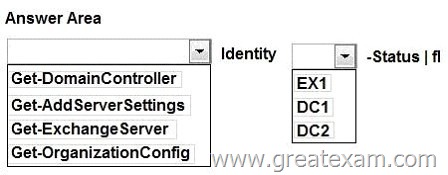
Answer: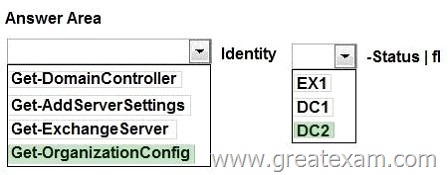
Explanation:
The Get-OrganizationConfig cmdlet is used to get configuration data for an Exchange organization.
We should specify DC2 as we are interested if information from EX1 is propagated to DC2. Example: This example gets the organization configuration information for the domain controller ContosoDC.
Get-OrganizationConfig -DomainController ContosoDC
Incorrect answers:
Not Get-ExchangeServer: The Get-ExchangeServer cmdlet is used to obtain the attributes of a specified Exchange server, but we are not interested in the attributes of EX1, we want to know if EX1 propagates changes to DC2.
Not Get-DomainController: The Get-DomainController cmdlet is used to view a list of domain controllers that exist in your organization, but we are interested in Active Directory information not a list of the Domain controllers.
Not Get-AddServerSettings: The Get-AdServerSettings cmdlet is used to view the Active Directory Domain Services (AD DS) environment settings in the current Windows PowerShell session, but we are not interested in PowerShell sessions.
https://technet.microsoft.com/en-us/library/aa997571%28v=exchg.150%29.aspx
QUESTION 216
Drag and Drop Question
You have an Exchange Server 2013 organization that contains the servers configured as shown in the following table.
You need to add EX2 to DAG2. The solution must maintain redundancy for all mailbox databases.
Which five actions should you perform in sequence before you can add EX2 to DAG2? To answer, move the appropriate actions from the list of actions to the answer area and arrange them in the correct order.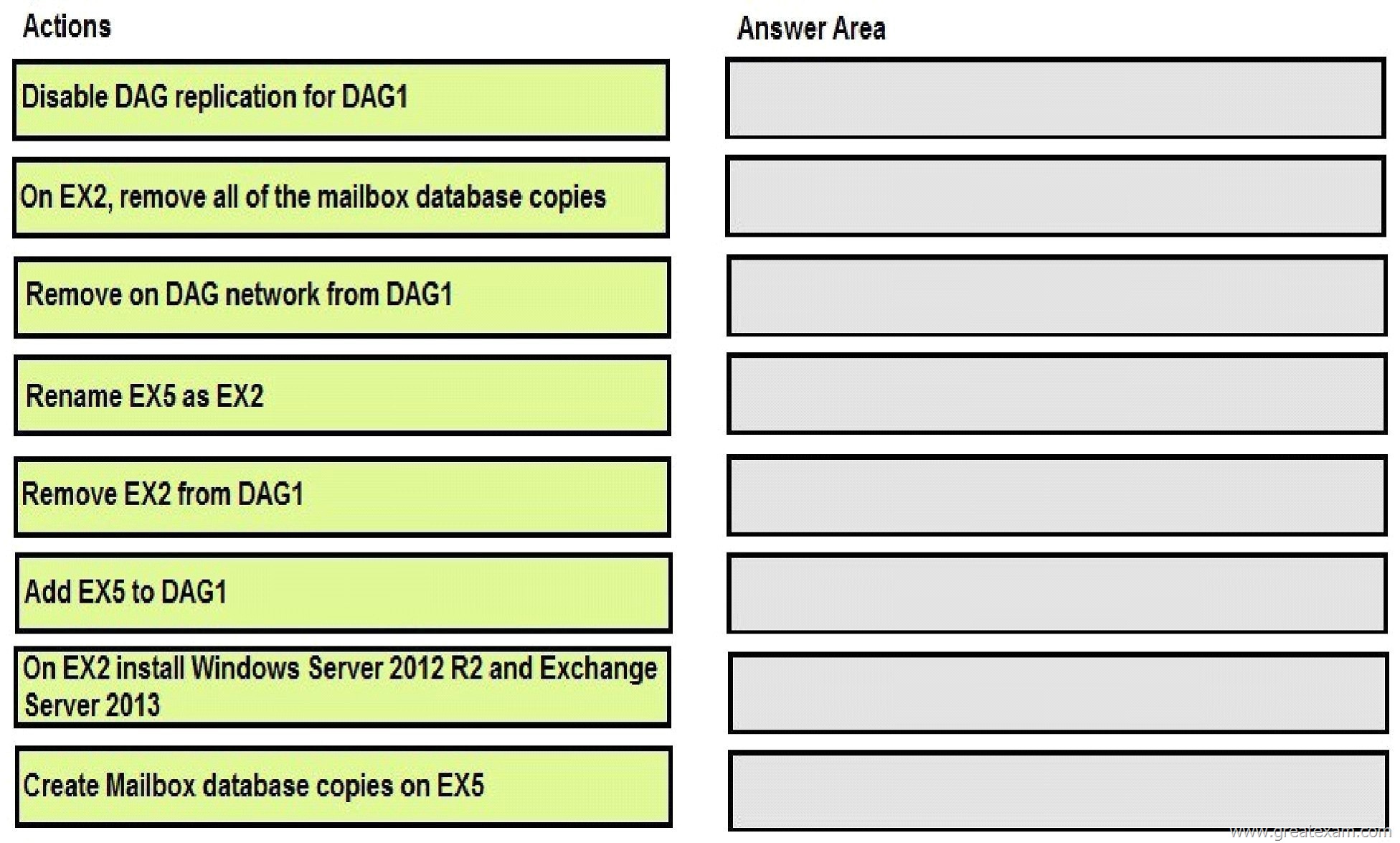
Answer: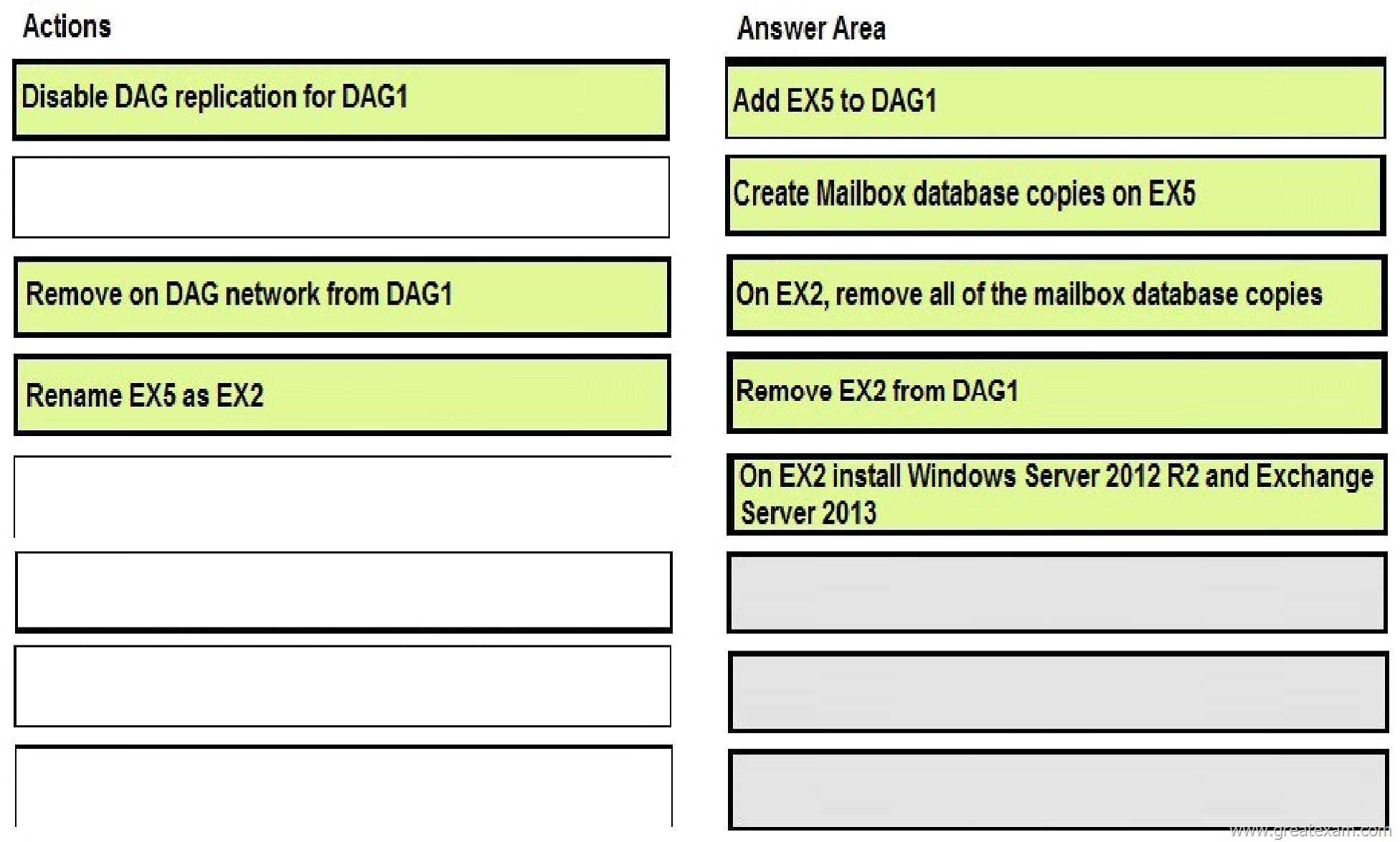
Explanation:
Box 1: Add EX5 to DAG1
We need to add EX5 to DAG1 for redundancy before we remove EX2.
Box 2: Create Mailbox database copies on EX5
We must set up EX5 mailbox database copies for redundancy before we remove EX2.
Box 3: On EX2, remove all of the mailbox database copies. We remove the DAG1 mailbox database copies from EX2. We must do this before removing EX2 from DAG1 as the Mailbox server must not host any replicated databases when it is removed.
Box 4: Remove EX2 from DAG1
Now can when EX5 being set up for DAG1 we can remove EX2 from DAG1. Box 5: On EX2 install Windows Server 2012 R2 and Exchange Server 2013 As the other members of DAG2 run Windows Server 2012 R2 datacenter we upgrade EX2 to Windows Server 2012 R2 as well.
Incorrect answers:
* There is no need to disable DAG replication for DAG1.
* There is no need to remove the DAG network from DAG1.
* Nothing would be accomplished by renaming EX5 to EX2.
https://technet.microsoft.com/en-us/library/dd297956%28v=exchg.150%29.aspx
QUESTION 217
Drag and Drop Question
You have an Exchange Server 2013 organization.
You need to recommend a solution to ensure that users can access their mailbox by using IMAP4.
The solution must meet the following requirements:
– The users must be able to download their email messages from multiple devices.
– The users must be able to look up their SMTP server from Outlook Web App.
– All IMAP4 connections must be audited.
What should you recommend? To answer drag the appropriate recommendation to the correct requirement. Each recommendation may be used once, more than once, or not at all. You may need to drag the split bar between panes or scroll to view content.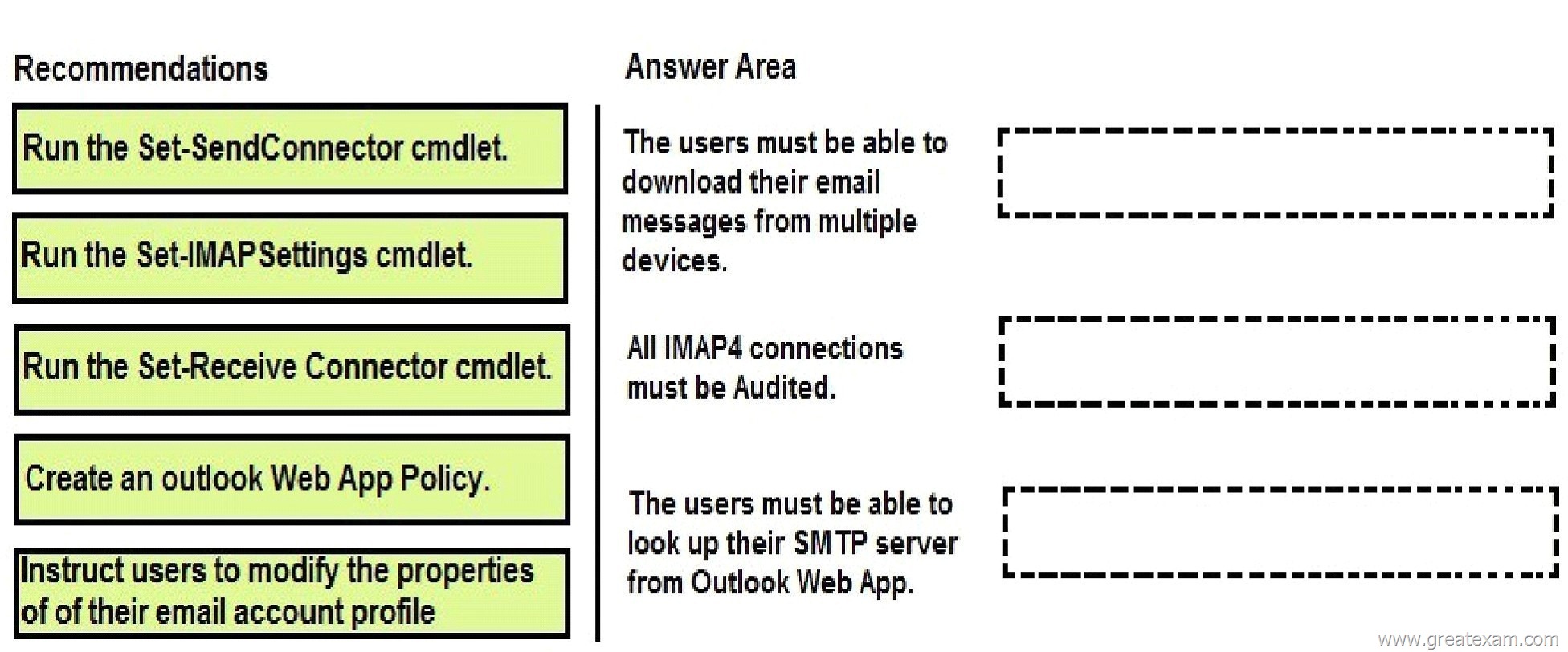
Answer: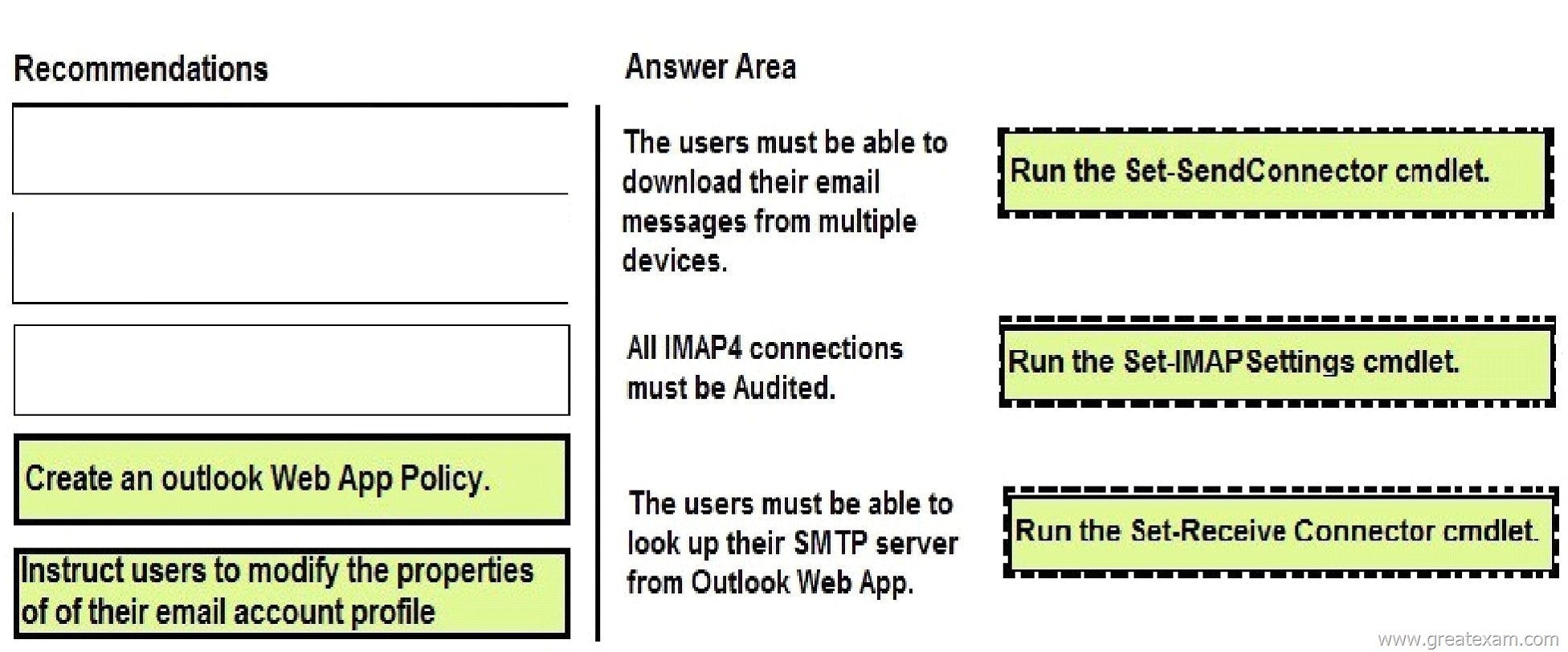
Explanation:
Box 1: Run the Set-SendConnector cmdlet.
In Microsoft Exchange Server 2013, a Send connector controls the flow of outbound messages to the receiving server. They are configured on Mailbox servers running the Transport service.
Most commonly, you configure a Send connector to send outbound email messages to a smart host or directly to their recipient, using DNS.
By default, Microsoft Exchange Server 2013 doesn’t allow you to send mail outside of your domain. To send mail outside your domain, you need to create a Send connector.
Box 2: You can set up logging with Set-IMAPSettings.
This example turns on IMAP4 protocol logging. It also changes the IMAP4 protocol logging directory to C:\Imap4Logging.
Set-ImapSettings -ProtocolLogEnabled $true -LogFileLocation “C:\Imap4Logging”.
Note: The Set-ImapSettings cmdlet is used to set specific IMAP4 settings for the server running Microsoft Exchange Server 2013 that has the Client Access server role installed and that’s running the Microsoft Exchange IMAP4 service.
Box 3: Run the Set-ReceiveConnector Settings cmdlet.
Exchange 2013 servers running the Transport service require Receive connectors to receive messages from the Internet, from email clients, and from other email servers. A Receive connector controls inbound connections to the Exchange organization.
Incorrect answers:
* A Web App Policy cannot be used to allow access their SMTP server from the Outlook Web app.
* We cannot rely on users to modify their email account profiles.
We need a centralized solution.
https://technet.microsoft.com/en-us/library/aa998252%28v=exchg.150%29.aspx
QUESTION 218
Drag and Drop Question
You have an Exchange Server 2013 organization that contains several servers in a single site. You run the Get-TransportConfig cmdlet and you receive the following output.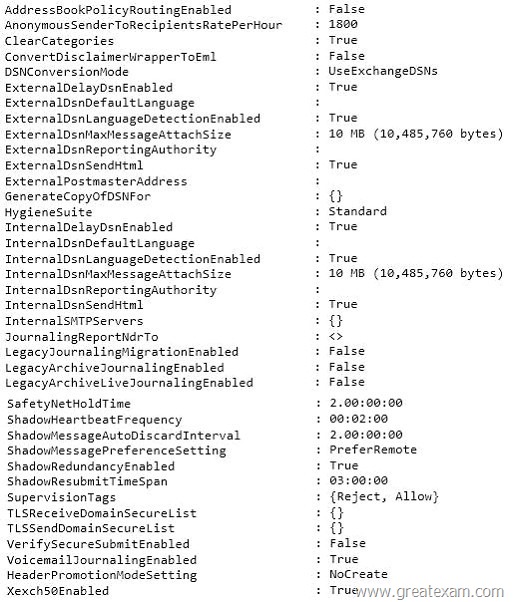
Use the drop-down menus to select the answer choice that completes each statement.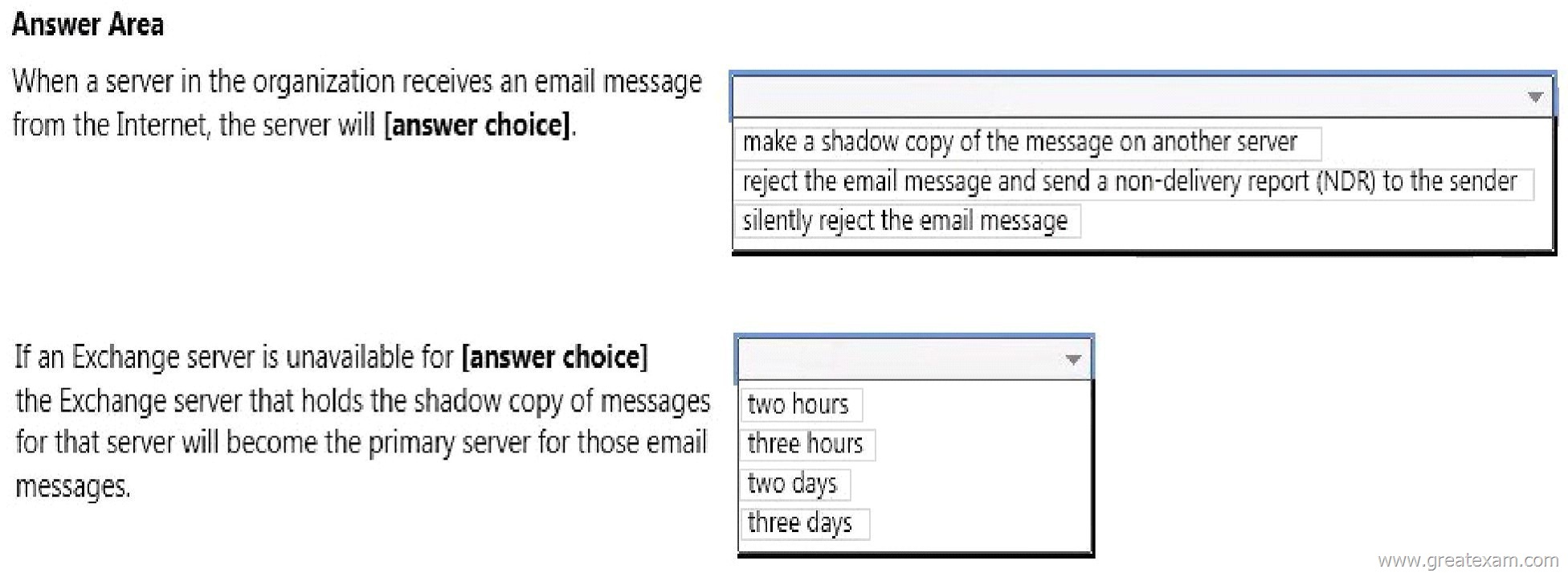
Answer: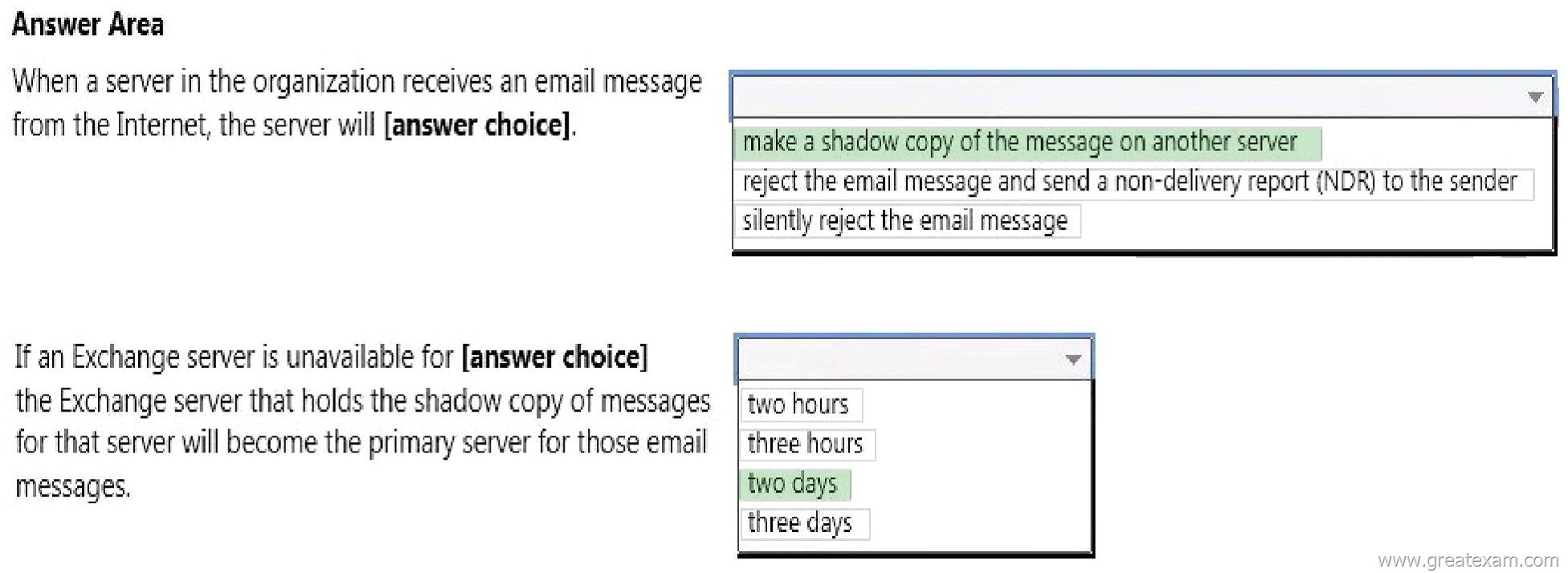
Explanation:
Box 1: make a shadow copy of the message on another server From the exhibit we see that: ShadowRedundacyEnable: True With shadow redundancy in Microsoft Exchange Server 2013 the transport server makes a redundant copy of any messages it receives before it acknowledges successfully receiving the message back to the sending server.
Box 2: two days
In the exhibit we see: ShadowMessageAutoDiscardInterval : 2.00:00:00 This means two days.
Note: Use the ShadowMessageAutoDiscardInterval parameter of the Set-TransportConfig cmdlet to configure the maximum age for shadow messages in your organization. By default, shadow messages are discarded automatically after two days.
This example reduces the retention period of shadow messages to four hours for your organization.
Set-TransportConfig -ShadowMessageAutoDiscardInterval 04:00:00
https://technet.microsoft.com/en-us/library/dd351027%28v=exchg.150%29.aspx
https://technet.microsoft.com/en-us/library/dd351046%28v=exchg.141%29.aspx
QUESTION 219
You have an Exchange Server 2013 organization.
Users connect to their mailbox by using Microsoft Outlook 2013 and mobile devices.
A user named User1 loses a mobile device.
You need to wipe the mobile device remotely.
Which cmdlet should you use?
A. Remove-MobileDevice
B. Clear-MobileDevice
C. Set-Mailbox
D. Remove-ActiveSyncDevice
Answer: B
Explanation:
The Clear-MobileDevice cmdlet deletes all user data from a mobile device the next time that the device receives data from the server running Microsoft Exchange Server 2013.
Incorrect answers:
Not A: The Remove-MobileDevice cmdlet is used to remove the mobile device partnership information that you specify from a user’s mobile device list stored in a mailbox on a computer running Microsoft Exchange Server 2013, but we don’t just want to remove the partnership information. We want wipe the device.
Not C: The Set-Mailbox cmdlet is used to modify the settings of an existing mailbox, but we need to wipe the mobile device.
Not D: The Remove-ActiveSyncDevice cmdlet is used to remove the mobile device partnership information that you specify from a user’s mobile device list stored in a mailbox on a computer running Microsoft Exchange Server 2013, , but we don’t just want to remove the device partnership information. We want wipe the device.
https://technet.microsoft.com/en-us/library/jj218658%28v=exchg.150%29.aspx
QUESTION 220
You verify that one email message sent to one mailboxes on EX1 are delivered successfully.
You also verify that all of mailbox databases on EX1 are mounted. Delete 20 GB of unnecessary data on EX1.
You discover that the hard disk drive on EX1 has only 10 GB of free space.
You delete 20 GB of unnecessary data on EX1. Users report that now they are receiving all of their email messages successfully to their mailbox.
You need to ensure that EX1 will prevent the delivery of email messages to mailboxes only if less than 2 GB of hard disk space is available.
What should you do?
A. Modify the Organization transport settings.
B. Disable the Safety Net feature.
C. Modify the EdgeTransportexe.config file.
D. Modify the mailbox database settings.
Answer: D
QUESTION 221
Hotspot Question
You have an Exchange Server 2013 organization. Each data center contains several Exchange servers and connects directly to the Internet. Each office has a Send connector to the Internet.
You configure each office as a separate site and you configure Main1 as a hub site.
The company opens a branch office that contains a small data center.
You deploy an Exchange Server 2013 server to the data center.
The data center has a direct network link to Main1.
All of the site link costs are set to the default values.
In the table below identify through which office the email message will be transmitted first for each scenario.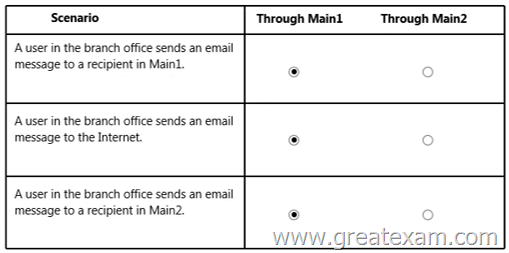
Answer: Pending
QUESTION 222
You have an Exchange Server 2013 organization that contains three Client Access servers named EX1, EX2, and EX3. The organization also contains eight Mailbox servers.
All users have client computers that have Microsoft Outlook 2013 installed.
You create a Network Load Balancing (NLB) cluster and add all of the Client Access servers as hosts in the cluster. The cluster has the following configurations:
– The default host is set to EX1.
– A port rule is configured for HTTPS traffic.
– The port rule has the affinity parameter set to Single.
– The port rule has the filtering mode set to Single host.
The port rule has the Handling priority set to the default option.
You discover that Outlook always connects to EX1.
You need to ensure that client connection are handled by all three Client Access servers.
What should you modify?
A. the filtering mode of the port rule.
B. the affinity parameter of the port rule.
C. the handling priority of the port rule.
D. the default host of the cluster.
Answer: C
QUESTION 223
Hotspot Question
You have an Exchange Server 2013 organization.
You deploy an Office Web Apps Server named Serverl.
You need to integrate the Office Web Apps Server and the Exchange Server organization.
What command should you run? To answer, select the appropriate options in the answer area.
Answer: Pending
QUESTION 224
Hotspot Question
Server1, Server2 and Server3 will be members of a database availability group (DAG) named DAG1.
You deploy a firewall between the internal network and the Internet.
You need to recommend a solution to meet the following requirements:
– Ensure that users can access their mailbox from the Internet by using Microsoft Outlook if a server fails.
– Ensure that users can access Unified Messaging (UM) services from the Internet if a server fails.
– Minimize costs.
What should you recommend? To answer, select the appropriate options in the answer area.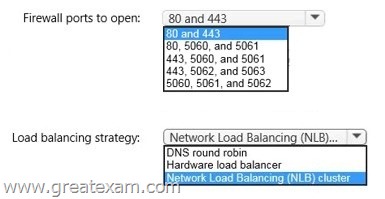
Answer: Pending
QUESTION 225
You have an Exchange Server 2013 organization that contains two servers named EX1 and EX2. EX1 and EX2 are members of a database availability group (DAG) named DAG1.
Your organization contains several managed availability overrides.
Both EX1 and EX2 have a copy of a mailbox database named MBX1. MBX1 is active on EX1.
You discover that MBX1 on EX2 has a status of ServiceDown.
You need to restore the status of MBX1 on EX2 to healthy as quickly as possible.
What should you do?
A. Start the Microsoft Exchange Mail Replication Service.
B. Run Start-Service MSExchangelS.
C. Run Start-Service MSExchangeRepl.
D. Start the Microsoft Exchange DAG Management Service.
Answer: C
GreatExam 70-341 Questions & Answers VCE dumps are rigorously checked before being put up for sale. So there is nothing irrelevant in 70-341 exam products and you get latest exam questions. It strive to deliver the best 70-341 exam product for top grades in your first attempt.